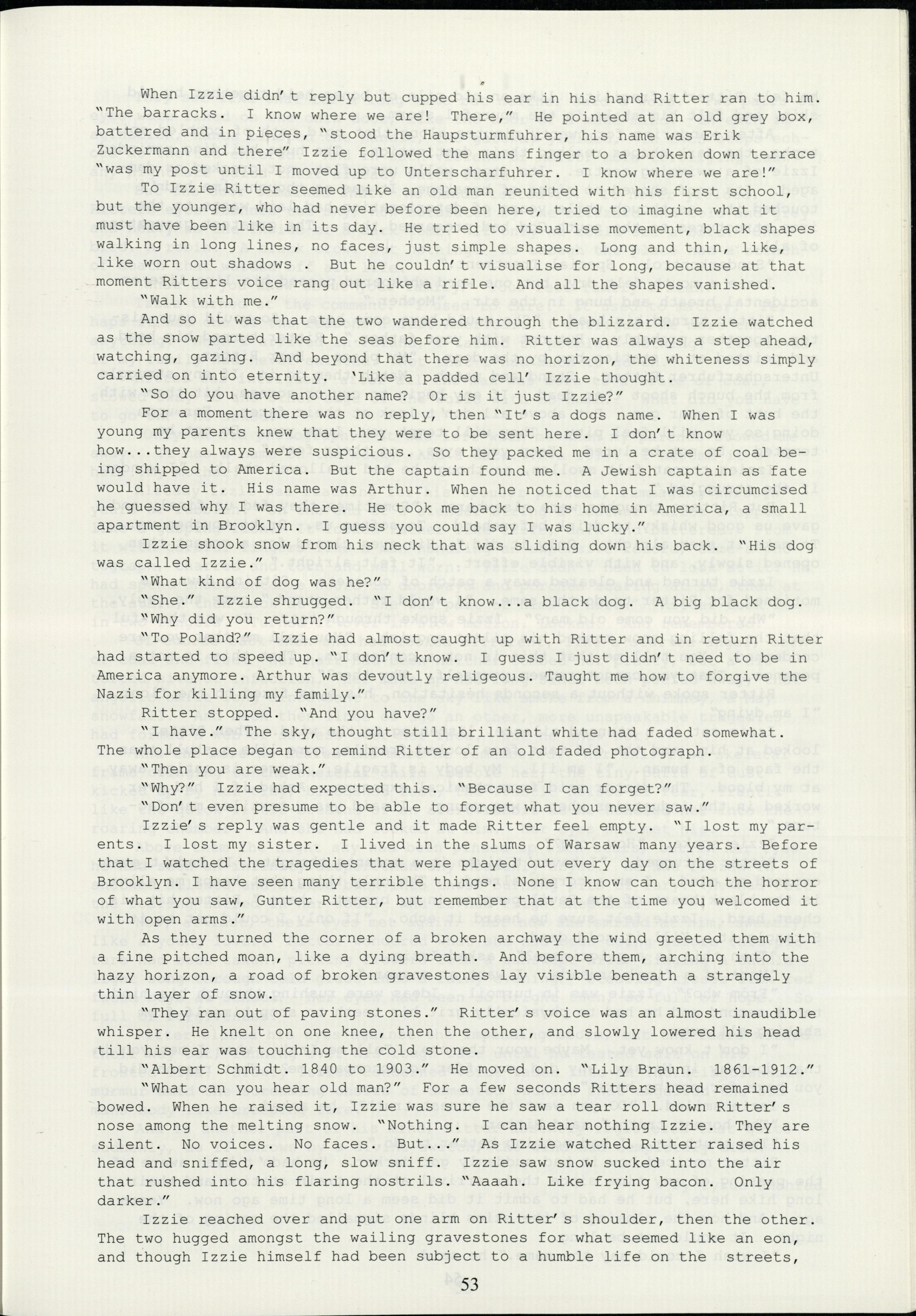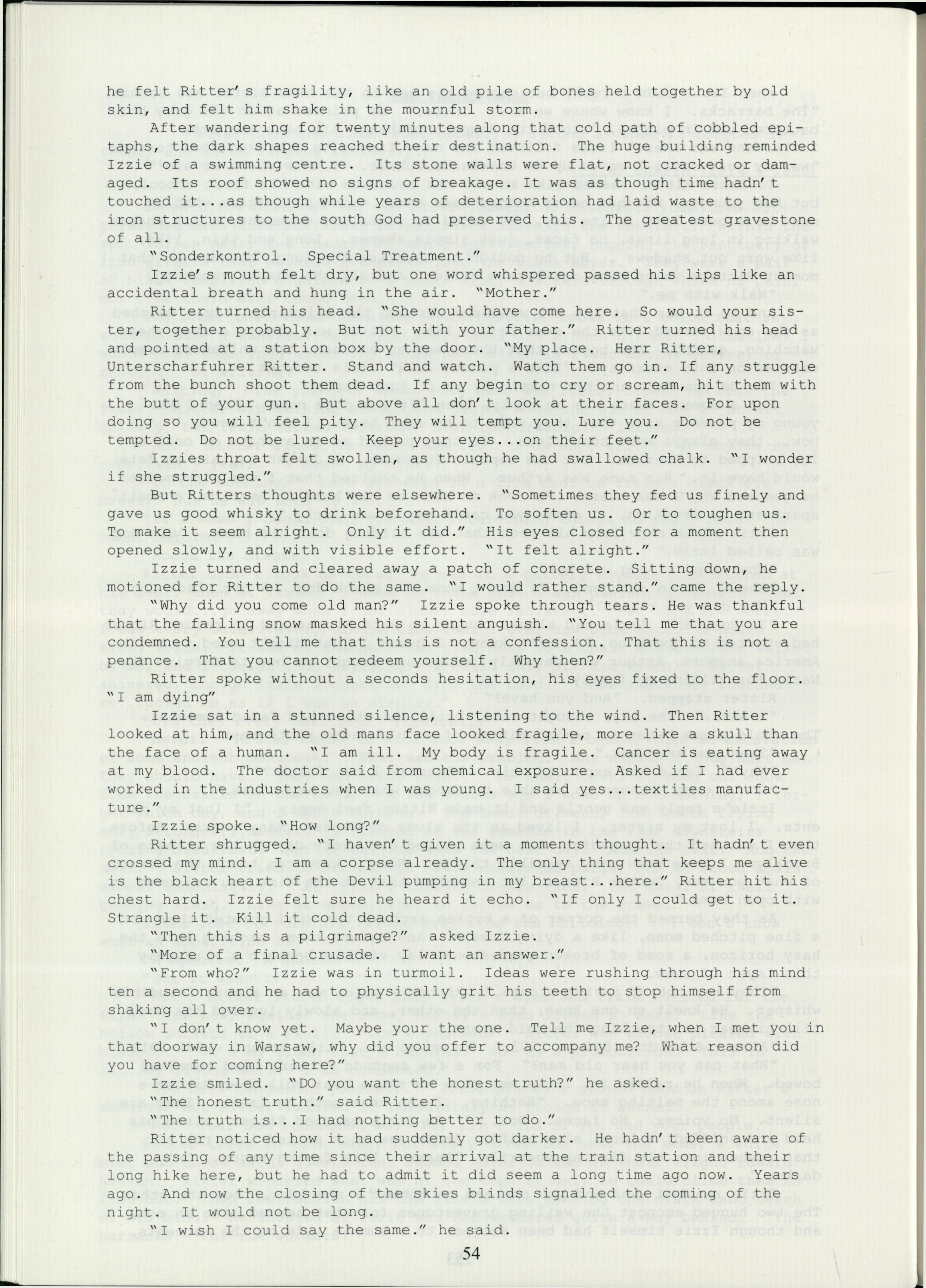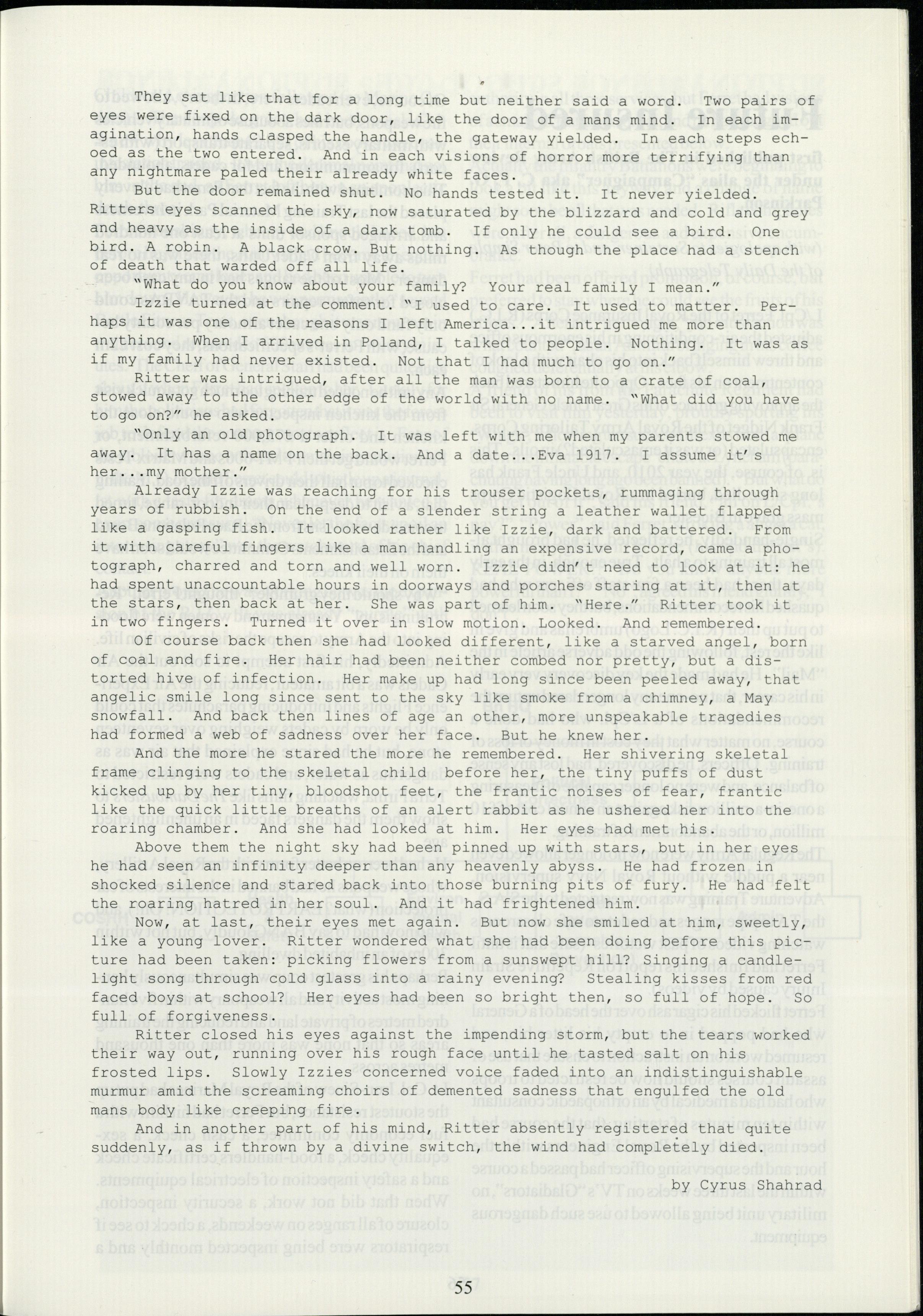
14 minute read
James Poole Short Story
from The Suttonian 1996
"Never does the human soul appear so strong as when it forgoes revenge, and dares forgive an injury." - E.H. CHAPIN (1814 - 1880)
Beneath the bleached sky the broken towers of Auschwitz rose like outstretched arms into oblivion, broken black limbs in the snowfall. Within the soft fallen mask, two shadows of men sought shelter, hugging the sanctuary of iron girders that pointed swordlike into the blank abyss. They were a pair of black templates engulfed in a white mist, a shield through which no pain, nor time could ever touch them. The older one, whose name was Gunter Ritter, spoke in a voice that resounded like a funereal wail from every wall and broken girder. `Sometimes I would hear them long after I'd woken up. Often if I was making coffee, or reading. Or writing." "Writing?" The younger, whose only name was Izzie, looked up from the floor. Ritter was walking around and gazing with the air of one at an art gallery, but Izzie looked relaxed. Even comfortable. "Letters?" "No." Ritter almost smiled. Almost. "I haven't written to anyone in over twenty years. I meant my diary." "In the morning?" Snow gathered in a fine dust on Izzie's black eyebrows. But he was used to it. "It's when I could find the most interesting things to say. About the night before." "About the dreams." Ritter didn't look as though he was in a gallery anymore. He stared at his feet, then at Izzie. "I used to think that I was punishing myself. That they would.. .go away when I got older, more resistant. But they got worse. T saw every face. ..every single face that I ever saw back then. I heard every voice. It was as though I was tied down to a chair and everyone walked by me, and I couldn't do anything. I could only sit and watch." Ritter shivered, though Izzie thought not from the cold. "Sometimes they touched me.. .poked me as if I was on display." "Did they every hurt you? Physically?" "Never." Ritter began to kick snow away from a bench, like an excavation of some ancient monument. "That was the problem. Why wouldn't they hurt me? They should have. They had every right." He knelt over, kicking out snow from the cracks in the wood." A few months ago I woke up one morning, I forget which day, and I smelt burning. The smell of,meat, like bacon frying only stronger... darker. I thought it was someone in the flat downstairs cooking breakfast. But it was the same the next day. And the next. And the next." Ritter tried to sit on his newly unearthed prize, but he stood again almost immediately. "At first I thought it was them. The smell of their burning flesh. Like an apparition, to follow me to the grave." Izzie rose to join his friend away from the buildings. "I don't know what an apparition is." "A spectre. A ghost." "But it wasn' t." "No." Ritter stared right into Izzie's eyes and Izzie noticed for the first time how, against the snow, Ritte;'s eyes looked so dark. Like the hollow sockets of a skull. "Don't you see?" Ritter was almost pleased with himself. "It's my flesh that's burning. Not as a premonition. This is it.. .my living Hell. I am condemned." "You have condemned yourself." Izzie placed a gloved hand on Ritter's shoulder but Ritter removed it immediately as though it burned. "No. Your God condemned me. For all I did to you and your people." Ritter tried to move away, but every direction held the same, a white mist and those awful towers that seemed never to end in their flight toward heaven. Ritter wondered what was at the top, if only he could climb them to find out. Then realisation hit him like a wave rushing the black sand beach of his mind. He shouted at Izzie who had wandered quite a way behind. "The barracks! For the workers!" 52
Advertisement
When Izzie didn't reply out cupped 015 ear in his hand Ritter ran LL , "The barracks. I know where we are! There," He pointed at an old grey now, battered and in pieces, "stood the Haupsturmfuhrer, his name was Erik Zuckermann and there" Izzie followed the mans finger to a broken down terrace "was my post until I moved up to Unterscharfuhrer. I know where we are!" To Izzie Ritter seemed like an old man reunited with his first school, but the younger, who had never before been here, tried to imagine what it must have been like in its day. He tried to visualise movement, black shapes walking in long lines, no faces, just simple shapes. Long and thin, like, like worn out shadows . But he couldn't visualise for long, because at that moment Ritters voice rang out like a rifle. And all the shapes vanished. "Walk with me." And so it was that the two wandered through the blizzard. Izzie watched as the snow parted like the seas before him. Ritter was always a step ,inead, watching, gazing. And beyond that there was no horizon, the whiteness simply carried on into eternity. `Like a padded cell' Izzie thought. "So do you have another name? Or is it just Izzie?" For a moment there was no reply, then "It's a dogs name. When I was young my parents knew that they were to be sent here. I don't know how.. .they always were suspicious. So they packed me in a crate of coal being shipped to America. But the captain found me. A Jewish captain as fate would have it. His name was Arthur. When he noticed that I was circumcised he guessed why I was there. He took me back to his home in America, a small apartment in Brooklyn. I guess you could say I was lucky." Izzie shook snow from his neck that was sliding down his back. "His dog was called Izzie." "What kind of dog was he?" "She." Izzie shrugged. "I don' t know...a black dug. A big black dog. "Why did you return?" "To Poland?" Izzie had almost caught up with Ritter and in return Ritter had started to speed up. "I don't know. I guess I just didn't need to be in America anymore. Arthur was devoutly religeous. Taught me how to forgive the Nazis for killing my family." Ritter stopped. "And you have?" "I have." The sky, thought still brilliant white had faded somewhat.. The whole place began to remind Ritter of an old faded photograph. "Then you are weak." "Why?" Izzie had expected this. "Because I can forget?" "Don't even presume to be able to forget what you never saw." Izzie's reply was gentle and it made Ritter feel empty. "I lost my par- ents. I lost my sister. I lived in the slums of Warsaw many years. Before that I watched the tragedies that were played out every day on the streets of Brooklyn. I have seen many terrible things. None I know can touch the horror of what you saw, Gunter Ritter, but remember that at the time you welcomed it with open arms." As they turned the corner of a broken archway the wind greeted them with a fine pitched moan, like a dying breath. And before them, arching into the hazy horizon, a road of broken gravestones lay visible beneath a strangely thin layer of snow. "They ran out of paving stones." Ritter's voice was an almost inaudible whisper. He knelt on one knee, then the other, and slowly lowered his head till his ear was touching the cold stone. "Albert Schmidt. 1840 to 1903." He moved on. "Lily Braun. 1861-1912." "What can you hear old man?" For a few seconds Ritters head remained bowed. When he raised it, Izzie was sure he saw a tear roll down Ritter's nose among the melting snow. "Nothing. I can hear nothing Izzie. They are silent. No voices. No faces. But..." As Izzie watched Ritter raised his head and sniffed, a long, slow sniff. Izzie saw snow sucked into the air that rushed into his flaring nostrils. "Aaaah. Like frying bacon. Only darker." Izzie reached over and put one arm on Ritter's shoulder, then the other. The two hugged amongst the wailing gravestones for what seemed like an eon, and though Izzie himself had been subject to a humble life on the streets,

he felt Ritter's fragility, like an old pile of bones held together by old skin, and felt him shake in the mournful storm. After wandering for twenty minutes along that cold path of cobbled epitaphs, the dark shapes reached their destination. The huge building reminded Izzie of a swimming centre. Its stone walls were flat, not cracked or damaged. Its roof showed no signs of breakage. It was as though time hadn't touched it.. .as though while years of deterioration had laid waste to the iron structures to the south God had preserved this. The greatest gravestone of all. "Sonderkontrol. Special Treatment." Izzie's mouth felt dry, but one word whispered passed his lips like an accidental breath and hung in the air. "Mother." Ritter turned his head. "She would have come here. So would your sister, together probably. But not with your father." Ritter turned his head and pointed at a station box by the door. "My place. Herr Ritter, Unterscharfuhrer Ritter. Stand and watch. Watch them go in. If any struggle from the bunch shoot them dead. If any begin to cry or scream, hit them with the butt of your gun. But above all don't look at their faces. For upon doing so you will feel pity. They will tempt you. Lure you. Do not be tempted. Do not be lured. Keep your eyes...on their feet." Izzies throat felt swollen, as though he had swallowed chalk. "I wonder if she struggled." But Ritters thoughts were elsewhere. "Sometimes they fed us finely and gave us good whisky to drink beforehand. To soften us. Or to toughen us. To make it seem alright. Only it did." His eyes closed for a moment then opened slowly, and with visible effort. "It felt alright." Izzie turned and cleared away a patch of concrete. Sitting down, he motioned for Ritter to do the same. "I would rather stand." came the reply. "Why did you come old man?" Izzie spoke through tears. He was thankful that the falling snow masked his silent anguish. "You tell me that you are condemned. You tell me that this is not a confession. That this is not a penance. That you cannot redeem yourself. Why then?" Ritter spoke without a seconds hesitation, his eyes fixed to the floor. "I am dying" Izzie sat in a stunned silence, listening to the wind. Then Ritter looked at him, and the old mans face looked fragile, more like a skull than the face of a human. "I am ill. My body is fragile. Cancer is eating away at my blood. The doctor said from chemical exposure. Asked if I had ever worked in the industries when I was young. I said yes.. .textiles manufacture." Izzie spoke. "How long?" Ritter shrugged. "I haven't given it a moments thought. It hadn't even crossed my mind. I am a corpse already. The only thing that keeps me alive is the black heart of the Devil pumping in my breast... here." Ritter hit his chest hard. Izzie felt sure he heard it echo. "If only I could get to it. Strangle it. Kill it cold dead. "Then this is a pilgrimage?" asked Izzie. "More of a final crusade. I want an answer." "From who?" Izzie was in turmoil. Ideas were rushing through his mind ten a second and he had to physically grit his teeth to stop himself from shaking all over. "I don't know yet. Maybe your the one. Tell me Izzie, when I met you in that doorway in Warsaw, why did you offer to accompany me? What reason did you have for coming here?" Izzie smiled. "DO you want the honest truth?" he asked. "The honest truth." said Ritter. "The truth is.. .1 had nothing better to do." Ritter noticed how it had suddenly got darker. He hadn't been aware of the passing of any time since their arrival at the train station and their long hike here, but he had to admit it did seem a long time ago now. Years ago. And now the closing of the skies blinds signalled the coming of the night. It would not be long. "I wish I could say the same." he said. 54

They sat like that for a long time but neither said a word. Two pairs -I eyes were fixed on the dark door, like the door of a mans mind. In each imagination, hands clasped the handle, the gateway yielded. In each steps echoed as the two entered. And in each visions of horror more terrifying than any nightmare paled their already white faces.
But the door remained shut. No hands tested it. It never yielded. Ritters eyes scanned the sky, now saturated by the blizzard and cold and r , and heavy as the inside of a dark tomb. If only he could see a bird. One bird. A robin. A black crow. But nothing. As though the place had a steno of death that warded off all life. "What do you know about your family? Your real family I mean." Izzie turned at the comment. "I used to care. It used to matter. Perhaps it was one of the reasons I left America... it intrigued me more than anything. When I arrived in Poland, I talked to people. Nothing. It was as if my family had never existed. Not that I had much to go on." Ritter was intrigued, after all the man was born to a crate of coal, stowed away to the other edge of the world with no name. "What did you true to go on?" he asked. "Only an old photograph. It was left with me when my parents stowed m.e away. It has a name on the back. And a date.. .Eva 1917. I assume it's her. ..my mother." Already Izzie was reaching for his trouser pockets, rummaging throupli years of rubbish. On the end of a slender string a leather wallet flapped like a gasping fish. It looked rather like Izzie, dark and battered. From it with careful fingers like a man handling an expensive record, came a photograph, charred and torn and well worn. Izzie didn't need to look at it: Is had spent unaccountable hours in doorways and porches staring at it, then at the stars, then back at her. She was part of him. "Here." Ritter tout it in two fingers. Turned it over in slow motion. Looked. And remembered. Of course back then she had looked different, like a starved angel, of coal and fire. Her hair had been neither combed nor pretty, but a torted hive of infection. Her make up had long since been peeled away, th angelic smile long since sent to the sky like smoke from a chimney, a May snowfall. And back then lines of age an other, more unspeakable tragedl:. had formed a web of sadness over her face. But he knew her. And the more he stared the more he remembered. Her shivering skeletal frame clinging to the skeletal child before her, the tiny puffs of dust kicked up by her tiny, bloodshot feet, the frantic noises of fear, frantic' like the quick little breaths of an alert rabbit as he ushered her into the roaring chamber. And she had looked at him. Her eyes had met his. Above them the night sky had been pinned up with stars, but in her eyes he had seen an infinity deeper than any heavenly abyss. He had frozen in shocked silence and stared back into those burning pits of fury. He had felt the roaring hatred in her soul. And it had frightened him. Now, at last, their eyes met again. But now she smiled at him, sweetl_„ like a young lover. Ritter wondered what she had been doing before this picture had been taken: picking flowers from a sunswept hill? Singing a candlelight song through cold glass into a rainy evening? Stealing kisses from red faced boys at school? Her eyes had been so bright --hen, so full of hope. So full of forgiveness. Ritter closed his eyes against the impending storm, but the tears worked their way out, running over his rough face until he tasted salt on his frosted lips. Slowly Izzies concerned voice faded into an indistinguishable murmur amid the screaming choirs of demented sadness that engulfed the old mans body like creeping fire. And in another part of his mind, Ritter absently registered that quite suddenly, as if thrown by a divine switch, the wind had completely died.

by Cyrus Shahrad

